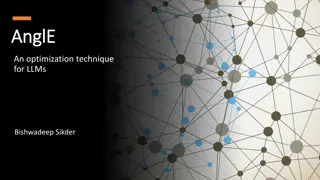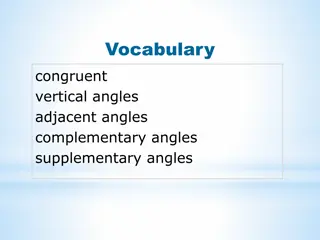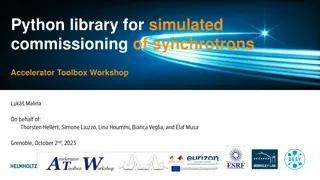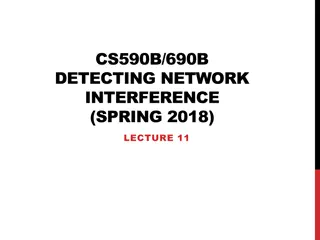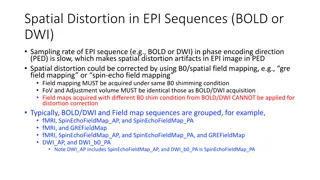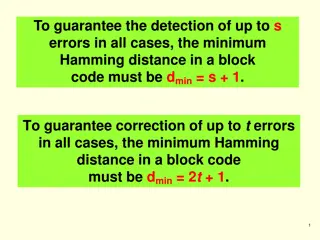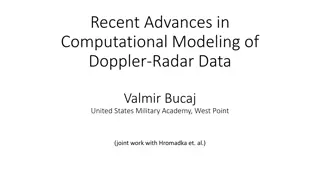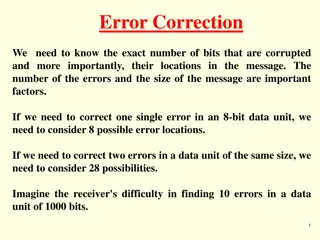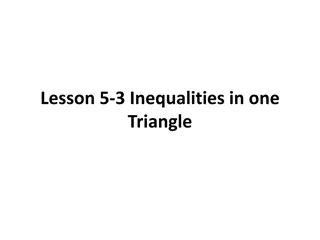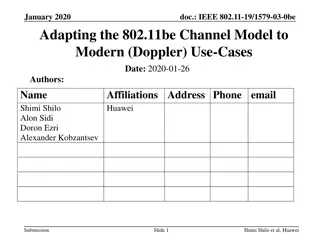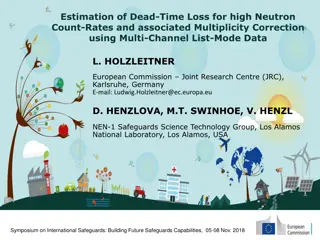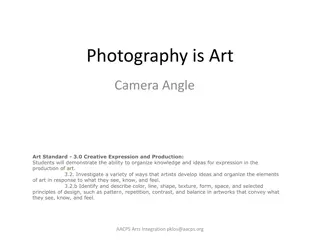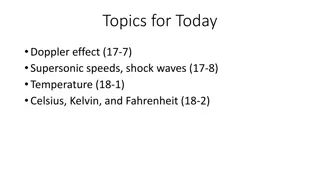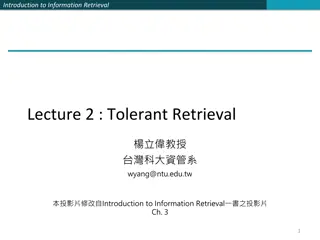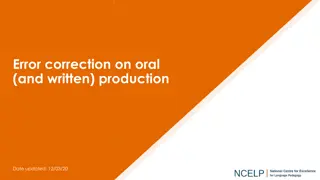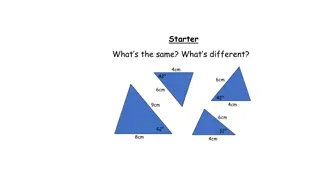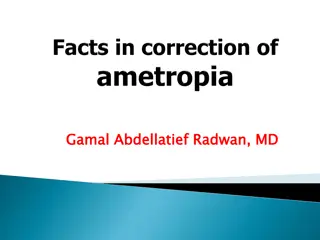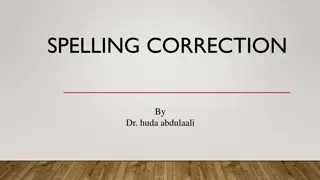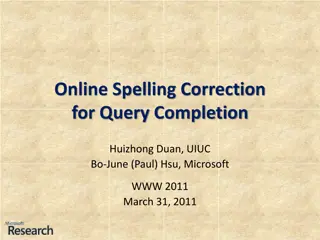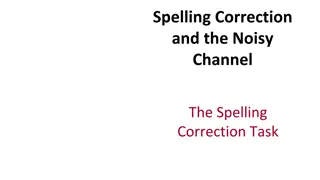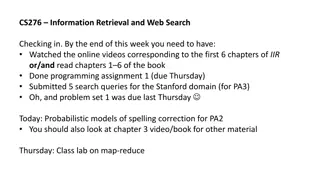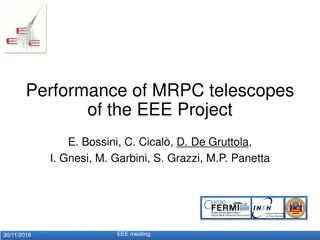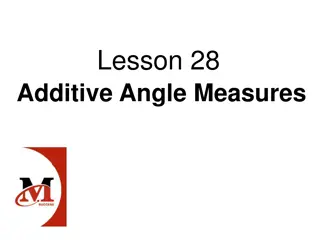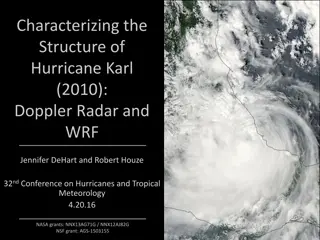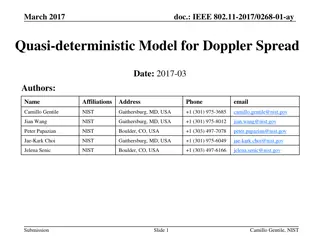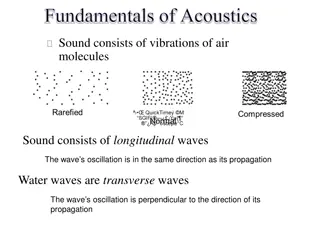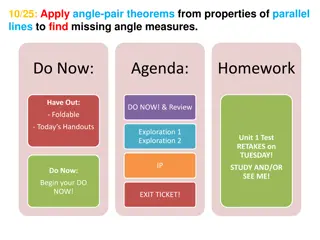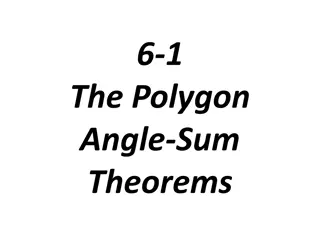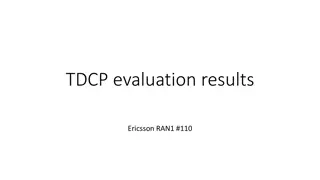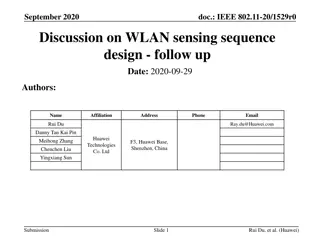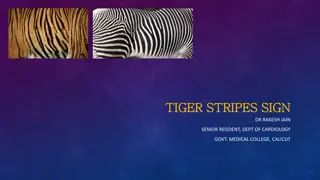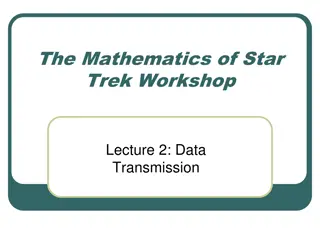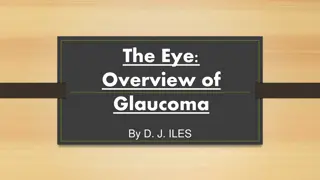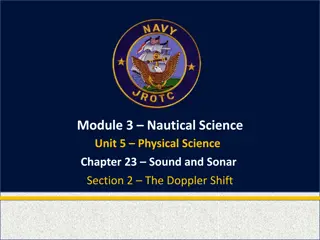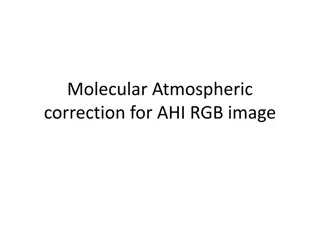AnglE: An Optimization Technique for LLMs by Bishwadeep Sikder
The AnglE model introduces angle optimization to address common challenges like vanishing gradients and underutilization of supervised negatives in Large Language Models (LLMs). By enhancing the gradient and optimization processes, this novel approach improves text embedding learning effectiveness.
9 views • 33 slides
Understanding Prism Terminology and Light Deviation
Prisms are optical devices that deviate light without changing its vergence. This module explores the various terminology associated with prisms, including Apex, Base, Refracting Angle, and Angle of Deviation. The passage of light through a prism follows Snell's Law, where the ray is deviated toward
4 views • 42 slides
Understanding Angle Relationships in Geometry
Explore key geometry vocabulary such as congruent, vertical, adjacent, complementary, and supplementary angles. Learn how to identify different types of angle pairs and calculate unknown angle measures using angle relationships. Visual examples and explanations enhance understanding.
1 views • 19 slides
Python Library for Simulated Commissioning of Synchrotrons Accelerator Toolbox Workshop
This workshop presented by Lukas Malina introduces a Python library for simulated commissioning of synchrotrons, focusing on commissioning simulations using AI translation from Matlab. The Python library aims to replicate machines with random errors, provide correction methods, and enhance performan
0 views • 15 slides
Restore Your Car's Shine with Paint Correction Service Lawrence
Is your car's paint looking tired and lackluster? Are you tired of seeing swirl marks, scratches, and other imperfections every time you look at your vehicle? It might be time to consider a Professional Paint Correction Service In Lawrence, look no further than The New Car Image.\nCall us - (816) 4
7 views • 5 slides
Understanding Network Interference and Censorship in Social Media
Discover the insights into detecting network interference, censorship, and social media manipulation through a collection of case studies, research papers, and real-world examples discussed in a Spring 2018 lecture. Topics include the goals of PAM 2011 paper, the Green Dam and Blue Dam projects, the
1 views • 27 slides
Spatial Distortion Correction in EPI Sequences: Field Mapping Examples
Spatial distortion artifacts in EPI sequences (BOLD or DWI) due to slow sampling rates in the phase encoding direction can be corrected using B0/spatial field mapping techniques. This correction requires obtaining field maps under the same B0 shimming conditions and with identical FoV and adjustment
0 views • 4 slides
Color Doppler Ultrasound Imaging Course
Enhance your medical skills with our Doppler Ultrasound Course! Master blood flow assessment and vascular diagnosis with expert-led training, hands-on practice, and cutting-edge techniques. Enroll now to advance your career. Visit our website \/\/ \/
1 views • 7 slides
Error Detection and Correction Codes in Block Coding
Explanation of minimum Hamming distance for error detection and correction in block codes, examples of code schemes, transmission scenarios with simple parity-check code, and insights on Hamming codes. The content covers the essential principles and capabilities of error detection and correction mec
1 views • 16 slides
Recent Advances in Computational Doppler Radar Data Modeling
Explore the latest developments in computational modeling of Doppler radar data, focusing on error estimation, dual vs. single pol radars comparison, uncertainty quantification, and methodology for analyzing Doppler radar predictions against gauge measurements. The study involves data from multiple
0 views • 40 slides
Understanding Error Correction Techniques in Data Communication
Exploring the importance of error correction in data transmission, with insights on forward error correction, retransmission, Hamming distance, and minimum Hamming distance concepts. Learn how redundancies and algorithms help detect and correct errors in data units of varying sizes, ensuring reliabl
0 views • 20 slides
Understanding Triangle Inequalities and Angle-Side Relationships
Explore the Vocabulary of Exterior Angle Inequality Theorem, Angle-Side Relationship Theorems 5.9 and 5.10. Understand how to order triangel angle measures and side lengths from smallest to largest through examples. Discover the principles governing triangles in terms of angles and side lengths.
0 views • 12 slides
Color Doppler Ultrasound Imaging Course
Great post! I really enjoyed reading it and found it to be informative and Amazing Blog Doppler Ultrasound Course<\/a>\n\n
8 views • 7 slides
Adapting the 802.11be Channel Model for Modern Doppler Use-Cases
The document discusses the adaptation of the 802.11be channel model to modern scenarios where devices are mobile. It explores the impact of movement on channel models, providing lab measurement results of Doppler Power Spectral Density. The study aims to enhance the evaluation of communication schem
0 views • 16 slides
Estimation of Dead-Time Loss for Neutron Count-Rates
This study discusses the estimation of dead-time loss for high neutron count-rates and the associated multiplicity correction using multi-channel list-mode data. The numerical method for high count-rate dead-time correction in neutron multiplicity counting is described, focusing on the use of multi-
0 views • 6 slides
Exploring Camera Angles in Photography
Photography is a form of art that involves various creative expressions, including the use of different camera angles to capture unique perspectives. This content explores different camera angles such as high-angle shot, low-angle shot, Dutch angle, and straight angle, each offering a distinct visua
1 views • 7 slides
Exploring Doppler Effect, Supersonic Speeds, and Temperature Scales
Discover the fascinating concepts of Doppler effect, supersonic speeds, and temperature scales like Celsius, Kelvin, and Fahrenheit. Dive into the interactions of sound waves with moving sources, shock waves at supersonic speeds, and the differences in musical notes produced by various instruments.
0 views • 15 slides
Comprehensive Overview of Information Retrieval Techniques
This comprehensive overview delves into information retrieval concepts such as tolerant retrieval, inverted index, intersecting posting lists, and spelling correction. It also explores how Google utilizes the Boolean model for search queries and discusses various methods for spelling correction in d
2 views • 44 slides
Enhancing Language Learning Through Error Correction Strategies
Explore the importance of error correction in language learning based on recommendations from The Pedagogy Review. Discuss strategies to anticipate, correct, and provide feedback on errors in both spoken and written language to facilitate effective language acquisition and communication. Consider th
1 views • 66 slides
Understanding Triangle Congruence Properties
Delve into the principles of congruent triangles by exploring the properties of side-side-side (SSS), side-angle-side (SAS), angle-side-angle (ASA), and right-angle-hypotenuse-side (RHS) congruence. Visual explanations help clarify how these properties determine if triangles are congruent.
0 views • 18 slides
Understanding Optimal Visual Correction in Ophthalmology
Providing optimal visual correction through the provision of spectacles in ophthalmology requires a blend of science and art. Ophthalmologists must possess knowledge and clinical experience to ensure each patient receives the best visual correction. Various concepts such as ametropia, optical correc
0 views • 27 slides
Revolutionizing Sonographic Blood Flow Measurement with PixelFlux
Novelties in PixelFlux technology offer a groundbreaking approach to sonographic blood flow measurement, enabling precise and accurate flow volume calculations through innovative features such as three-dimensional Doppler angle correction, pixelwise flow analysis, and dynamic measurements throughout
0 views • 12 slides
Advanced Techniques in Spelling Correction
Explore various methods such as edit distance, n-gram overlap, Jaccard coefficient, and context-sensitive spell correction for accurate document editing and word correction. Learn how these techniques help improve accuracy in language processing tasks.
0 views • 12 slides
Enhancing Online Spelling Correction for Query Completion: A Study by Huizhong Duan and Bo-June (Paul) Hsu
This study delves into improving online spelling correction for query completion, focusing on common misspellings, keyboard adjacency errors, and ambiguous word breaking issues. It aims to assist users in expressing their information needs accurately while reducing input effort. The research address
0 views • 21 slides
Understanding Spelling Correction Through the Noisy Channel Model
Explore the fascinating world of spelling correction using the Noisy Channel Model, which involves tasks such as error detection, correction, types of errors, rates of errors, and strategies for non-word and real-word spelling errors. Learn about applications and implications in various contexts suc
0 views • 51 slides
Spelling Correction Techniques and Models in Information Retrieval
Explore the world of spelling correction through the lens of Information Retrieval and Web Search. Dive into probabilistic models, non-word and real-word spelling errors, rates of spelling errors, correction strategies, and more. Gain insights from Christopher Manning on applications, types of error
0 views • 48 slides
Performance Analysis of MRPC Telescopes in the EEE Project
Detailed examination of the performance of MRPC telescopes in the EEE Project, focusing on topics such as time resolution, time slewing correction comparison, beta distributions, and Time Over Threshold strategy for time correction. The analysis involves understanding contributions, applying correct
0 views • 17 slides
Understanding Additive Angle Measures
In this lesson on additive angle measures, students learn how to find missing angle measures when two non-overlapping angles combine to form a larger angle. Essential questions are posed, and students are guided through solving problems involving angle decomposition and measurement. Practical activi
0 views • 46 slides
Analyzing Hurricane Karl (2010): Doppler Radar Insights
Detailed analysis of Hurricane Karl (2010) using Doppler radar and WRF simulations, focusing on precipitation patterns over Mexican terrain and underlying processes. Includes NASA and NOAA grants, airborne radar measurements, WRF simulations, flight tracks, and velocity distributions comparison betw
0 views • 19 slides
Parameterized Model for Doppler Spread in mmWave Systems
This document presents a parameterized model for Doppler spread in mmWave systems based on measurements with an 83 GHz channel sounder. The model is linked to the Quasi-deterministic (QD) propagation channel model adopted by the work group. It discusses Doppler frequency shift, channel sounder confi
0 views • 10 slides
Understanding Fundamentals of Acoustics: Waves, Frequencies, and the Doppler Effect
Sound involves vibrations of air molecules, with sound waves being longitudinal and water waves transverse. The transduction of sound into mechanical energy in the ear allows us to hear and perceive frequency/pitch. Exploring the Doppler Effect enhances our understanding of how motion affects sound
0 views • 10 slides
Understanding Angle Pair Theorems in Geometry
Explore the application of angle-pair theorems in finding missing angle measures using properties of parallel lines. Learn about different types of angle pairs such as vertical angles, corresponding angles, same-side interior angles, alternate exterior angles, and more through engaging activities an
0 views • 14 slides
Understanding Polygon Angle-Sum Theorems
Explore the Polygon Angle-Sum Theorems that determine the sum of interior angle measures in polygons. Learn about the Polygon Angle-Sum Theorem, number of sides in polygons, finding angle sums, and the corollary for regular polygons. Practice using the theorems to calculate interior angle measures i
0 views • 18 slides
Wireless Communication Evaluation Results and Channel Characteristics Analysis
This content discusses TDCP evaluation results in Ericsson RAN1, comparing precoding based on reciprocity versus CSI feedback. It also explores autocorrelation versus Doppler shift, Doppler spread estimation based on channel peaks, and proposed descriptions for AltA and AltB methods. The analysis de
0 views • 6 slides
Analysis of WLAN Sensing Sequence Design Using Ambiguity Function and Range-Doppler Map
In this document, the authors from Huawei discuss the analysis of employing the ambiguity function for WLAN sensing sequence design. They delve into the ambiguity function's definition, analysis, and its comparison with the range-Doppler map. The document highlights the importance of ambiguity funct
0 views • 15 slides
Understanding Tiger Stripes Sign in Cardiology
Tiger Stripes Sign, also known as Zebra Stripes Appearance, is a unique Doppler signal observed in cardiac imaging, commonly associated with valvular regurgitation. It is characterized by high-amplitude band-like signals and may indicate complications like flail prosthetic valves. The mechanism behi
0 views • 7 slides
The Mathematics of Star Trek: Data Transmission and Error Correction
Explore the fascinating world of data transmission in the context of Star Trek, delving into binary codes like ASCII, error correction techniques, and the importance of accurate data transmission in futuristic technologies such as transporters. Discover how binary codes encode information and how er
0 views • 33 slides
Understanding Glaucoma: Types, Symptoms, and Treatment Options
Glaucoma is a group of eye conditions that can lead to irreversible vision loss. There are different types such as open-angle, closed-angle, secondary, and normal-tension glaucoma, each with unique characteristics and causes. Symptoms vary from rapid damage in closed-angle glaucoma to gradual periph
0 views • 13 slides
Understanding Sound and Sonar: Exploring Doppler Shift in Physical Science
Explore the principles of sound, Doppler shift, and sonar in nautical science. Learn about the characteristics of sound in seawater, the Doppler effect, and how sonar technology is used in detecting underwater objects. Key terms like fathometer, fish finder, hydrophone, active sonar, and passive son
0 views • 64 slides
Atmospheric Correction Techniques for Satellite Image Enhancement
Atmospheric correction is essential for improving the quality of Remote Sensing images captured by satellites. This process involves correcting for the effects of atmospheric gases such as scattering and absorption on the measured Top-of-Atmosphere (TOA) reflectance. Techniques like molecular correc
0 views • 8 slides
